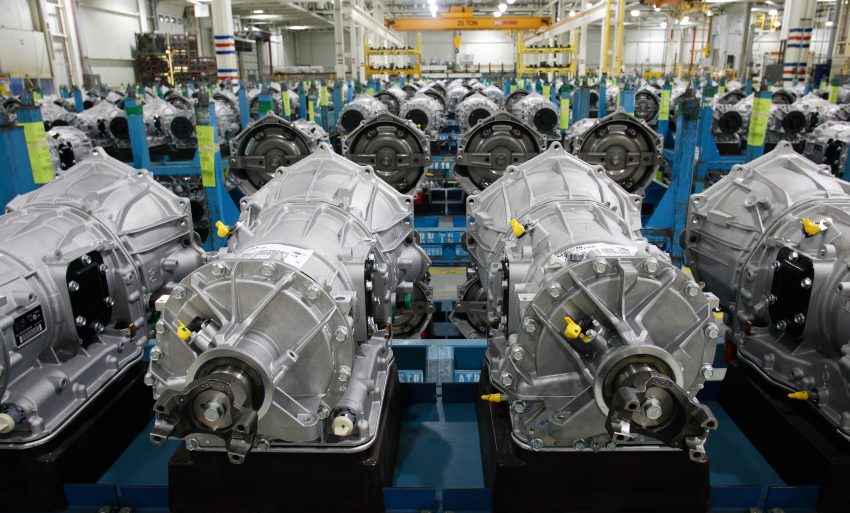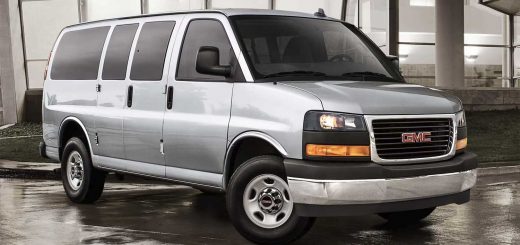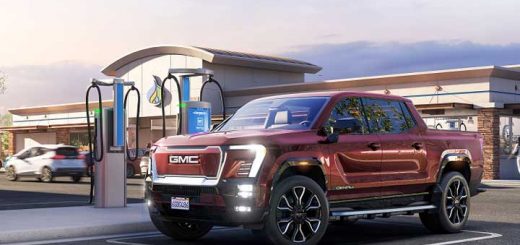Ford Motor Co. and General Motors Co. have put aside their differences to officially announce a signed agreement to jointly develop nine and ten-speed automatic transmissions for cars, crossovers, SUVs, and trucks that will be for both front and rear-wheel-drive vehicles. They goal is to improve vehicle performance and fuel economy with these new automatic transmissions. Plus it beats the option of a CVT in our eyes. It also confirms the rumor that’s been swirling around since September of 2012 that the two automakers were putting their heads together for nine and ten-speed transmission efforts.
According to those previous reports, GM is forwarding the design of a nine-speed gearbox for use in front-wheel-drive vehicles. Meanwhile, Ford will be fronting the development of a 10-speed transmission for rear-wheel-drive vehicles such as pickups, SUVs and possibly performance cars. However, these details have not been made official.
In jointly collaborating, the pact enables both GM and Ford to design, develop, engineer, test, validate and deliver these new transmissions for their vehicles faster and at lower cost than if they each went solo. It also marks the third time in the past decade that GM and Ford have teamed up for transmission development. Each company will manufacture its own transmissions in its own plants, though with many common components.















Comments
I suspect transmissions with that many gears will be weaker and only good for low powered cars. It`s physics. Either it has to be bigger/heavier to contain all those extra parts , or if it is the same volume as say a four-speed auto , the parts are going to be smaller/weaker.
In any case I can’t see the reliability of these new cars being very good for the long-term.
Cam phasers , Direct Injection and all this other complexity adds expense and decreases reliability.
(My spare car is a 1990 Jeep Cherokee 4WD with 255K . Everything works and engine doesn`t leak any oil , and uses very little).
I’d hate to be the guy getting a 9-speed trans rebuilt or paying for a new DI fuel pump/injectors.
Not really, ever see an F1 tranmission (i know its not automatic,and different purpose but…) it is the size of an adults fist, has 7 speeds, and handles 900hp at 18000rpms. Technology can overcome the limitations you suggest.
Besides,it already says in the article that the 10 speed will be for RWd,and possibly performance applications.
guess what ,the RWD in question is for cars like Mustang V8, Camaro V8, F150 trucks, Silverado Trucks etc. not low power stuff
You suspect it’s just physics is it? And must only be good for low powered cars and are weaker?
I suspect you don’t know a whole lot about engineering, kinematics, or mechanics, let alone general physics.
I have your same concerns, can GM make a trans that lasts longer than 65,000 miles? I had to rebuild a 4T60E at 65K. A family member had to rebuild a RWD GMC truck trans at 60K- both vehicles purchased new, serviced with light duty driving. My 4T80E in my Seville STS started slipping, sold it. We have left the GM brand over these issues.
If it don’t have a 150K mile warranty, GM won’t be getting back my Toyota business.
I have owned 5 cars that have had the 4T60E transmissions. 3 Pontiac Grand Prix’s, 1 Olsmobile Intrigue, and a Chevrolet Malibu SS. They’ve all lasted over 230,000 miles (I drive my cars a lot), and the transmission was still in working order. I got rid of them because the car itself was just getting old. So I don’t know how you drive your cars, but I loved all of those cars and am happy with my purchases with GM. I have heard so many positive reviews on the 6T70-6T75 tranmissions. Don’t be on a GM site and be bashing, and threatening they’re sales with a Toyota, phhhhh. Have you ever noticed how many recalls Toyota has had in the past years? Toyota doesn’t care about quality, they cut across anything and everything they can to save money. I’ve had 2 Toyota’s (Camry/Corolla) and 1 Honda (Accord) I hated them all! My Toyota’s were so cheap and lacked many features, the transmission on my Camry at 75,000 miles was starting to slip and make all sorts of noises. My Accord had so many steering problems, I can’t even name them all off.
Complexity does not reduce reliability if done properly. The real issue is too often as complexity emerges companies take short cuts.
To be honest the more complex cars have become the longer the warranties have become as has the life of many engines and transmissions. It used to be common to see failed trannys and today it is rare.
While it is true there is a possibility that more could go wrong it is not true that it will.
Case in point Hyundai and GM have DOHC engines. Hyundai uses a rubber belt and GM uses a chain to drive the cams. The belt can fail at anytime after 65,000 miles and the chain normally will last the life of the car. The belt fails you replace the engine as it will take out the valves and a piston or two.
The price of the GM vehicle is a little more but it is little things like this that add to the durability of the product vs. a lower price point.
You get what you pay for.
I really wonder how much design is GM and If the Ford people are just tailoring the design to their needs while sharing the cost. GM has for years been the top transmission developer in the industry doing transmission’s for so any other companies including BMW. Rolls and Jag.
and GM has been the top developer for many other thing too!
Will these transmissions be dual clutch? Either GM will be stepping into this or Ford will be stepping out.
From what we gather, they will be single clutch. In all honesty, a well-done single clutch (like the new 8-speed that shifts in .3 and downshifts in .15) is better than a DCT because the packaging is smaller and they are lighter.
@VeranoHatch Why would Ford be stepping out? The only dual clutch Ford currently offers is the PowerShift mated to the four-cylinders in the Fiesta and Focus (and their respective variants); it’s not like Ford is completely and totally invested in the technology; instead, it will do what all automakers do — what’s best for itself, and for its consumer.
But believe it or not, automatics (with torque converters) are still good performers, and don’t drag *that* much. Autos are especially good when you consider that many (most?) dual clutch gearboxes are (currently) horrible during start/stop scenarios and can’t take a lot of power (hence the reason behind Audi using traditional automatics in the S6 and up).
Either way, GM might be on its way to developing a dual-clutch gearbox after all:
http://gmauthority.com/blog/2013/04/gm-opel-announce-new-transmissions-automated-manual-as-part-of-powertrain-revitalization-strategy/
… or maybe not.
+1, agree with Manoli and Alex… It isn’t like conventional single clutch units are now irrelevant because dual clutch is on the scene. They are lighter and can still be very, very, quick. Koenigsegg uses them for this very reason. Their shift times with their in house transmission has made a DCT useless to them, plus their tranny allows for much higher torque with a smaller and less complex tranny (more torque dense so to speak). And hey, without having to spend time on a DCT they are perfecting valve-less/ free valve engines
I wonder if Ford`s version will be a PowerTurd like their Focus/Fiesta uses.
When can we expect to see these in production?
Case IH started using an 18 speed transmission in there tractors starting back in the 80s. Most of the mechanics at the Case house have never worked on one except for replacing the flex plate between it and the engine. Engine is a cummins diesel and it normally needs overhauled before the transmission. No need to use clutch with this transmission so you could call it an automatic, just select the gear you want and it takes it there. They did however have some problems with the new ones but it was due to incorrect programming. Shift program was trying to shift it between gears. It can be done just hope they do it correctly.
They are polishing a turd. Electric is the future. Tesla and solar have my vote. It’s high time for the majority to stop burning fossil fuels .. It’s fine for airplanes and such but any reduction is good by me. No I’m not a liberal, just a progress lover. The oil companies can suck it.
Scott,
google GM timing chain problems and you will see huge numbers of gm 3.6 liter owners that have problems with worn/stretched timing chains. If under 100,000 miles gm warranty pays for the repair. If out of warranty costs exceed $5,000 to repair. So my point is don’t give us a lecture on how gm timing chains are better than Hyundai timing belt.